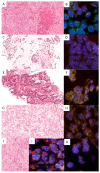Fluorescent In Situ Hybridization Testing Allows the Diagnosis of NRG1 Gene Fusions in Lung and Pancreas Cancers with No Other Identified Oncogenic Driver
- PMID: 40723230
- PMCID: PMC12294116
- DOI: 10.3390/cancers17142347
Fluorescent In Situ Hybridization Testing Allows the Diagnosis of NRG1 Gene Fusions in Lung and Pancreas Cancers with No Other Identified Oncogenic Driver
Abstract
Some pancreatic ductal-type (PDADK) and lung adenocarcinomas (LADK) lacking other molecular drivers are reported to harbor NRG1 fusions as potential novel therapeutic targets. We investigated the feasibility of a fluorescent in situ hybridization (FISH)-based diagnosis of NRG1 fusions in a case series of PDADK and LADK lacking other identified oncogenic drivers. First, among a case series of PDADK, KRAS analyses (PCR followed in PCR-negative cases by RNA sequencing-RNAseq) found 27/162 (16.7%) KRAS wild-type cases, among which 1/162 (0.6%) NRG1 fusion was diagnosed using FISH. Secondly, among a case series of LDAK, 191/446 (42.8%) cases had no molecular alterations in EGFR, KRAS, BRAF, HER2, MET, ALK, ROS1 and RET according to NGS and FISH analyses and, among them, 4/446 (0.9%) cases had NRG1 fusions using FISH. Finally, four additional cases out of the two previously mentioned cases series (1 PDADK and 3 LADK) with NRG1 fusions diagnosed by first-line RNAseq were also concluded as NRG1 FISH-positive. The NRG1 FISH tests for the nine NRG1 FISH-positive cases resulted in 50% to 80% of positive tumor nuclei, all with single 3'-NRG1 FISH signals. In our series, of the 22 cases analyzed with both NRG1 FISH (positivity criterion of at least 15% of tumor nuclei with a split between the 5'- and the 3'- parts of the probes and/or isolated single 3'-NRG1 signal) and RNAseq, 17 cases were FISH- RNAseq- and 5 cases were FISH+ RNAseq+ (no FISH+ RNAseq- or FISH- RNAseq+ cases in our study) resulting in 100% sensibility and specificity for the NRG1 FISH test. In the case of no access to RNAseq, NRG1 FISH consists of a valuable tool searching for NRG1 fusions in patients with advanced cancers.
Keywords: NRG1 fusion; RNA-sequencing; fluorescent in situ hybridization; lung cancer; pancreatic cancer.
Conflict of interest statement
Biocartis company has provided IdyllaTM dedicated cartridges for this study but has not taken part in data interpretation or manuscript writing in this work. The authors would like to thank Omnium group for support. The authors declare no funding, employment or any financial or non-financial competing interests in this work.
Figures

Similar articles
-
Diagnostic test accuracy and cost-effectiveness of tests for codeletion of chromosomal arms 1p and 19q in people with glioma.Cochrane Database Syst Rev. 2022 Mar 2;3(3):CD013387. doi: 10.1002/14651858.CD013387.pub2. Cochrane Database Syst Rev. 2022. PMID: 35233774 Free PMC article.
-
Pure Apocrine Intraductal Carcinoma of Salivary Glands: Reassessment of Molecular Underpinnings and Behavior.Head Neck Pathol. 2024 Jun 27;18(1):58. doi: 10.1007/s12105-024-01653-2. Head Neck Pathol. 2024. PMID: 38935197 Free PMC article.
-
Signs and symptoms to determine if a patient presenting in primary care or hospital outpatient settings has COVID-19.Cochrane Database Syst Rev. 2022 May 20;5(5):CD013665. doi: 10.1002/14651858.CD013665.pub3. Cochrane Database Syst Rev. 2022. PMID: 35593186 Free PMC article.
-
[Volume and health outcomes: evidence from systematic reviews and from evaluation of Italian hospital data].Epidemiol Prev. 2013 Mar-Jun;37(2-3 Suppl 2):1-100. Epidemiol Prev. 2013. PMID: 23851286 Italian.
-
Laboratory-based molecular test alternatives to RT-PCR for the diagnosis of SARS-CoV-2 infection.Cochrane Database Syst Rev. 2024 Oct 14;10(10):CD015618. doi: 10.1002/14651858.CD015618. Cochrane Database Syst Rev. 2024. PMID: 39400904
References
-
- American Cancer Society. [(accessed on 12 August 2022)]. Available online: https://www.cancer.org/cancer/lung-cancer/detection-diagnosis-staging/su....
LinkOut - more resources
Full Text Sources
Research Materials
Miscellaneous

